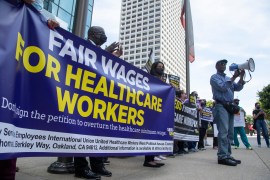Pharmaceutical Leaders Caution Against Amending TRIPS Rules to Allow Generic Production of AIDS Drugs
Representatives of the world's largest pharmaceutical companies, meeting yesterday in Geneva, Switzerland, with officials from the World Trade Organization, warned that proposed amendments to the 1994 Trade-Related Intellectual Property Rights Agreement that would make it easier for countries to produce generic forms of patented medicines during time of national emergency could cause pharmaceutical research and development to "dry up," Reuters/Boston Globe reports. Under the TRIPS agreement, new drug patents are protected in the WTO's 142 member nations for 20 years. However, AIDS activists have pushed for amendments to the agreement to allow compulsory licensing during a declared national health emergency, saying that the current rules impede drug access in poorer nations. A statement from the British-based charity Oxfam urged the WTO to reconsider its stance. "The essential flaw of TRIPS is to oblige all countries, rich and poor, to grant at least 20 years' patent protection for new medicines, thereby delaying production of inexpensive generic substitutes upon which developing-country health services and poor people depend," the statement said. However, according to Dr. Rolf Krebs, chair of Boehringer Ingelheim and president of the International Federation of Pharmaceutical Manufacturers Associations, "More flexibility in TRIPS would be disastrous for continuing investment in research and development on AIDS." IFPMA Director-General Harvey Bale explained that changes to the agreement could "open the door for governments to abuse patents on all protected drugs" by falsely declaring national health emergencies when none existed. Both men added that investors would perceive such an action as a "threa[t]" to the pharmaceutical industry and would demand that drug firms focus on less controversial diseases such as cancer. "So it is important to maintain a stable basis for this industry to invest, not just for the sake of the shareholders but also in the public interest," Bale said, adding that the number of AIDS drugs in development decreased over the last three years as AIDS activists stepped up their campaign for generic drug rights. Drug manufacturers in India and Brazil legally produce generic forms of patented AIDS medications because the agreement has not yet gone into enforcement there. The United States last year filed a complaint with the WTO against Brazil, which produces generic drugs to provide free to its HIV-positive citizens, but withdrew it this summer. The delegates are not expected to take action on the request for amendments this week, but the issue is likely to resurface during the November WTO ministerial meeting in Qatar (Evans, Reuters/Boston Globe, 9/20).
This is part of the Morning Briefing, a summary of health policy coverage from major news organizations. Sign up for an email subscription.





